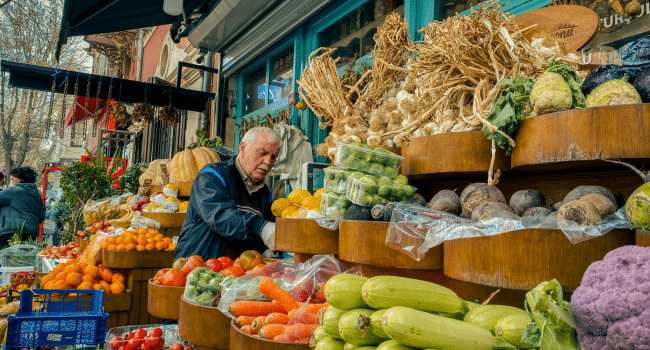Table of Contents
Fresh produce isn’t just a kitchen staple—it’s a high-volume, high-velocity business. In Dubai, a city known for its cosmopolitan lifestyle and sophisticated food scene, the wholesale fruits and vegetables trade plays a crucial role in supplying restaurants, supermarkets, hotels, and food processors. If you’re an entrepreneur eyeing this segment, the opportunity is clear—but so is the competition.
The wholesale produce market is dynamic, driven by seasonal supply chains, international logistics, and the city’s growing demand for fresh, high-quality imports. So the question isn’t just “Can I start a wholesale fruits and vegetables business in Dubai?” It’s “How do I build a profitable, scalable operation in one of the fastest-moving sectors of the economy?”
Here’s how to think about it.
Understanding the business model
Wholesale trading in fruits and vegetables is fundamentally about scale and speed. You’re buying in bulk, often from multiple geographies, and selling to local buyers who expect freshness, competitive pricing, and on-time delivery. Your customers could be five-star hotel chains, busy juice bars, airline catering companies, or corner grocery stores.
Margins tend to be thin, so success is largely determined by how efficiently you can move your product. That means choosing the right import partners, maintaining cold storage and transport infrastructure, and forecasting demand to avoid spoilage or stockouts.
Another crucial factor is trust. In this business, long-term relationships—especially with restaurants and retailers—are more valuable than one-off sales. Building reliability into your operations from day one will pay off over time.
Navigating licensing, logistics, and food safety
Starting a wholesale produce business in Dubai involves securing the right commercial license, registering your company, and ensuring you meet the city’s strict food import and safety regulations. This includes obtaining permits to trade perishable goods, setting up appropriate cold storage facilities, and complying with standards issued by Dubai Municipality.
You’ll also need to factor in customs procedures if you’re importing products—particularly around documentation, health certifications, and inspection protocols. Many traders work with third-party logistics providers, especially during the startup phase, to manage freight forwarding, customs clearance, and warehousing.
From a logistical standpoint, the location of your operation matters. Being close to distribution routes, wholesale markets, and major buyers can improve your delivery times and reduce costs.
While your primary focus is on sourcing, logistics and supply partners, it’s also worthwhile to consider safety measures for your warehouse and handling staff. That’s why teaming up with a reliable manufacturer of food-industry safety boots can help ensure that everyone working in your cold-storage, loading docks or processing zones has the right protective gear. This kind of investment supports safe operations and helps reinforce your commitment to hygiene and professionalism.
Building your supplier and buyer networks
In wholesale trading, your suppliers are just as important as your customers. You’ll need to establish sourcing relationships with farms, cooperatives, and exporters—whether in nearby countries or in major agricultural hubs like India, Egypt, the Netherlands, or Kenya. Many businesses attend produce expos, trade fairs, and use international brokerage networks to connect with reliable exporters.
On the buyer side, success often comes down to account management. Supermarkets and HORECA (hotel, restaurant, catering) clients may expect regular deliveries, custom packaging, and even credit terms. That means your sales strategy must go beyond price and focus on service, consistency, and flexibility.
Word of mouth matters here, but so does a strong local presence. Consider attending local B2B food trade events, building relationships with procurement managers, and even investing in a small sales team to visit clients directly.
Embracing technology and differentiation
As competition in the produce sector intensifies, companies that use data and digital tools are gaining an edge. This might mean using inventory management systems to track perishables, automating purchase orders with suppliers, or even creating a B2B ordering app for regular customers.
In a market where many products look similar, branding can be a powerful differentiator. Whether you’re offering organic fruits, air-freighted berries, or traceable farm-to-fork vegetables, how you present your offering matters. Businesses that invest in packaging, storytelling, and transparent sourcing are seeing increased loyalty and higher margins.
Pricing will always be a factor—but value-added services, like express delivery, extended hours, or bundled offerings, can help you carve out your niche.
Where to launch and grow your business
Starting a business is one thing. Growing it with clarity, confidence, and a strong network is another. That’s where choosing to start a business in Dubai with the right platform makes a difference.
Dubai South Business Hub was designed for entrepreneurs who are ready to act. Positioned in the heart of Dubai’s logistics and commercial corridor, it provides not just the licenses and office space you need to begin—but also the strategic tools, insights, and support that help turn ideas into execution.
Whether you’re importing grapes from South Africa, sourcing lettuce from local hydroponic farms, or building a cold-chain distribution network, the ecosystem here is built to remove friction and accelerate your growth.
Dubai South Business Hub is more than a business destination. It’s a launchpad for those ready to scale—with a community that values resilience, innovation, and real-world progress. For produce traders ready to compete in a global city, it offers the clarity, momentum, and support needed to thrive.
